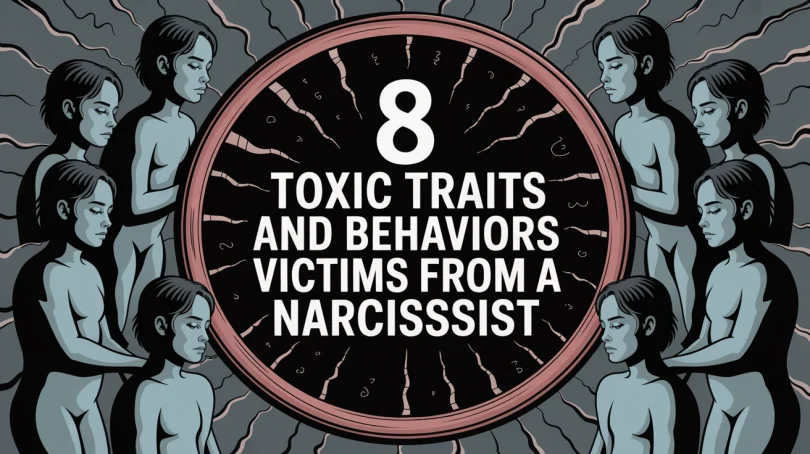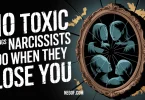Today, I want to share something about a difficult topic: how victims become aware of the negative characteristics and behaviors of a narcissist when they were in a relationship with them. I know from personal experience that acknowledging this occurred is likely one of our biggest challenges.
But yes, co-narcissism exists, and sadly, it produces the same or even the same type of self-destructive and poisonous cycle we see in our narcissistic lovers. Only by embracing such bitter truths are we able to let go, heal, and move forward in life.
The Narcissist’s Target: Vulnerable Strength
Narcissists tend to target strong, intelligent, independent, and often very successful individuals who are, however, lacking something in their lives. It’s not unusual for narcissists to hook a person during their most vulnerable moments when they feel lonely or experience hardships, such as a personal loss or illness.
Many victims are preconditioned from childhood, making them susceptible to manipulation, especially if they grew up with a narcissistic parent, for instance. Once living with a narcissist becomes their “new normal,” victims subconsciously adopt some of the narcissist’s negative traits and behaviors as a coping or survival mechanism. The isolation they experience prevents exposure to outside influences that could prevent changes in their behavior.
Stages of Influence in a Narcissistic Relationship
I’ll try to list my points in the order they may occur in an abusive relationship with a narcissist, though everyone’s experience may differ.
1. Love Bombing and Magical Thinking
In the beginning, when you get to know the narcissist, their most effective tools are love bombing and future faking. This is when you adopt the narcissist’s magical thinking and start believing in the fantasy world they pull you into. Narcissists believe in this fantasy themselves, envisioning a happy and successful life. Why else do they react so strongly and resentfully when confronted with reality? Narcissists are highly delusional, often childlike in their approach to life.
They need this fantasy to keep moving forward, and the longer you stay with them, so you will. However, hope is often a result of fear, and merely believing in hope without taking action traps you in a cycle of endless misery. In reality, there is no improvement with a narcissist, only a total downfall for you, the longer you stay.
Related Topics:
5 Real Proofs Narcissists are Evil
7 Things Narcissists Do That’ll Never Make Sense to You
How do narcissists exploit innocent victims?
2. Eroding Personal Boundaries
Love bombing leads to my next point: adopting the narcissist’s problems with personal boundaries. Narcissists are prone to overstepping or tearing down other people’s boundaries by sweet-talking or coercing them to do what they want. However, they struggle to maintain personal boundaries, often being naive and engaging in dangerous behaviors that can lead to their demise or harm those around them.
For example, narcissists may feel a need to prove themselves, leading to reckless actions like driving too fast, engaging in dangerous sexual practices, or making irresponsible financial investments. As a victim, you may begin to mirror these boundary issues, losing your sense of self in the process.
3. Isolation and Antisocial Behavior
Once the narcissist has hooked you, they often isolate you from your support system. This is when everything begins to change, both internally and externally. At this stage, victims often adopt some of the narcissist’s antisocial behaviors, antagonizing those around them, usually friends or family who recognize the narcissist’s harmful influence.
The narcissist creates a “Bonnie and Clyde” illusion, fostering an “us against the world” mentality. You may find yourself constantly defending the narcissist and your relationship. The narcissist doesn’t even have to do much to cause drama and division once they’ve made themselves the sole center of your attention.
4. Resentment and Grudges
This isolation breeds resentment, my next point. Narcissists harbor hate and grudges against many people, often for life. They may share falsehoods about others to manipulate you, silencing your feelings and judgment. I remember my ex-partner saying, “Holding a grudge is like drinking poison and expecting the other person to die.” Of course, he said this to excuse his bad behavior while harboring deep resentment for his alleged enemies. Over time, this turns you into a bitter and resentful person, just as bitter as the narcissist.
5. Triangulation and Jealousy
Once the narcissist has isolated you and claimed you as theirs, they may suddenly invite others into your relationship through triangulation, a sadistic tool in their repertoire. Only the narcissist is allowed to make new friends, as they are aware they have little to offer and fear someone else could take them away. Often, these third parties are unaware they’re being used, but they notice your sudden resentment toward them.
Triangulation also builds the narcissist’s support system of “flying monkeys,” who enable them to play the victim and portray you as unstable when needed. This jealousy fuels insecurity, another trait you may adopt.
6. Insecurity and Low Self-Esteem
It’s a misconception that narcissists are full of self-confidence. They famously “fake it till they make it,” but they are far from confident, relying on power and control to stabilize their low self-esteem. When you’re with a narcissist, their constant criticism provokes feelings of inadequacy, self-doubt, and low self-esteem in you, mirroring their struggles. Destroying your confidence doesn’t benefit them; it only hurts both of you.
Narcissists target strong, independent people, but trauma bonding and eroded self-worth make you dependent on their validation, just as they depend on validation from others. You may transition from being self-determined to someone who struggles with decision-making, fearing abandonment, and feeling unable to live independently, despite having been self-sufficient all along.
7. Hypervigilance and Paranoia
The narcissist’s triangulation, shady behavior, and the need to walk on eggshells around them create paranoia and hypervigilance in you. These are traits narcissists know well, as they inherently distrust others. Being in constant fight-or-flight mode changes your brain’s structure, with the amygdala (the reptilian part of the brain) taking over to act on instinct for survival. Over time, narcissists can turn a formerly secure person into an anxious shell of themselves.
It’s not uncommon to suffer from anxiety, depression, or post-traumatic stress as a result. Many people with complex post-traumatic stress (CPTSD) are misdiagnosed with borderline or even narcissistic personality disorder due to overlapping behaviors. However, unlike narcissism, CPTSD is a natural response to trauma, not a personality disorder, and is treatable. While triggered behavior may seem erratic, it lacks the grandiosity and entitlement central to narcissism. Victims are more likely to be people pleasers and givers, while narcissists are takers.
8. Fear of Intimacy
As a result of this dynamic, you may develop a fear of intimacy similar to the narcissist’s. Survivors of narcissistic abuse, who may have once been secure or anxious, may adopt an avoidant attachment style, keeping relationships at arm’s length. Healing is essential to unlearn these fears and recognize that not everyone is out to take advantage of you.
Learning to trust yourself to recognize red flags and practicing open, honest communication are key to finding a partner who understands your trust issues and offers patience, compassion, and understanding.
Summary: Adopted Traits and the Path to Healing
In summary, victims of narcissistic abuse may adopt the following traits from their narcissistic partners:
- Fantastical thinking
- Lack of boundaries
- Antisocial behaviors
- Resentment and jealousy toward others
- Neediness and insecurity
- Hypervigilant paranoia
- Symptoms of post-traumatic stress
- Fear of intimacy
It’s not uncommon for survivors to want to reconnect and repair broken relationships with friends or family once they regain clarity and step out of the fog the narcissist created. If you’re a friend or family member of someone who has been through this, please forgive them, they didn’t know what they were doing. What they need most now is your love and support to piece themselves back together.







Leave a Comment